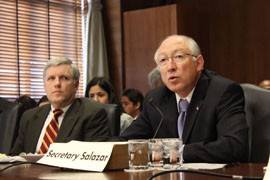Cronkite News has moved to a new home at cronkitenews.azpbs.org. Use this site to search archives from 2011 to May 2015. You can search the new site for current stories.
Historic $3.4 billion Cobell settlement final, clearing way for tribal payments
WASHINGTON — Native Americans could start getting payments by the end of this year from a historic $3.4 billion settlement of tribal claims that the federal government mismanaged trust funds for years, an attorney said Tuesday.
Dennis Gingold’s prediction follows final approval over the weekend of the Cobell settlement, when the last deadline to appeal the settlement expired with no new challenges.
The approval ends years of legal wrangling and was hailed by the White House and Interior Department this week.
Gingold was an attorney for the plaintiffs in the class-action suit, which included as many as a half-million Native Americans, including about 30,000 from seven Arizona tribes – the Tohono O’odham, Navajo, Salt River Pima-Maricopa, San Carlos Apache, Hopi, Gila River and Colorado River.
While the Departments of Justice and Treasury still have to certify the settlement before money can be released for the settlement, Gingold said the first payments could come sometime in December. Those payments of $1,000 would go to tribal members who had trust accounts with the federal government.
GCG Inc., the New York-based company that will oversee the disbursement, did not return calls seeking comment.
Interior Secretary Ken Salazar said in a prepared statement Monday that the finalization of the settlement “begins a new era of trust administration.”
“With the settlement now final, we can put years of discord behind us and start a new chapter in our nation-to-nation relationship,” Salazar said.
In a prepared statement Monday, President Barack Obama said he welcomed the settlement which cleared “the way for reconciliation between the trust beneficiaries and the federal government.”
Gingold said the federal funds could be transferred to a court-approved JP Morgan account sometime during the week of Dec. 10. From there, it could take a day or two before the first batch of checks are written and sent to the last mailing addresses of class members.
Thousands of class members died before they could receive a settlement check, including Elouise Cobell, a member of the Blackfeet tribe of Montana who filed the lawsuit in 1996 charging that the federal government had mismanaged tribal trust lands for decades.
A settlement was proposed in 2009 and Congress approved the $3.4 billion Cobell deal in November 2010, the largest ever against the U.S. government.
Under the settlement, $1.5 billion will be used to pay class members directly and $1.9 billion will be used to buy back “fractionated land,” properties that have lost value because they have been divided by multiple heirs over generations. Up to $60 million will go toward the creation of college and vocational school scholarships for American Indians and Alaska Natives.
Opponents of the settlement filed two lawsuits that went all the way to the Supreme Court, which refused to hear one of the cases in October. Plaintiffs in the second case then voluntarily withdrew their appeal earlier this month.
Gingold said that as of 2009, an estimated 12,000 people had died waiting for a settlement to be finalized. He said 17 years is enough time for everyone to wait.
“It’s about time,” Gingold said.







